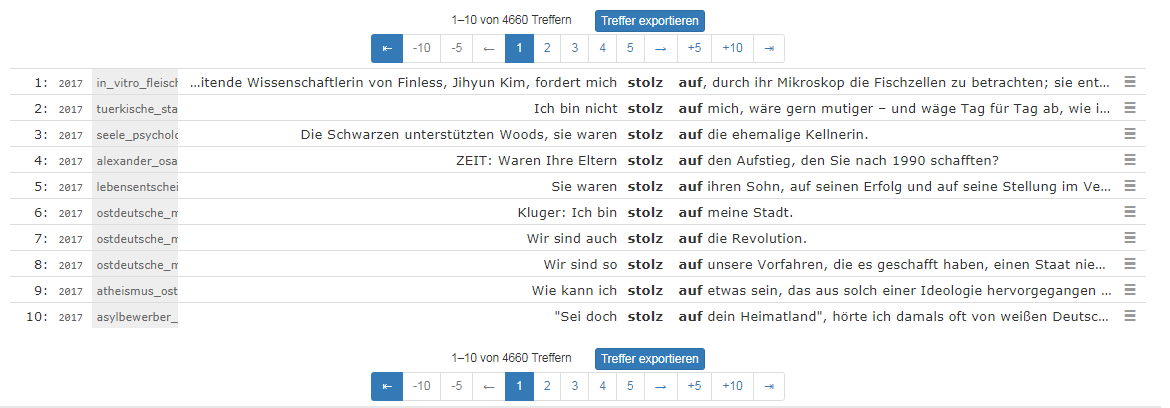Adjective-Preposition Collocations
In this module, you will review some German adjective-preposition collocations (APCs) which, like the verb-preposition collocations (VPCs) in the previous modules, require the use of either accusative or dative case.
Activity 1
First, let’s review the meaning of these APCs by matching them with their English equivalents. If needed, you can consult the online dictionary LEO.
Activity 2
Now, let’s explore these APCs by using Das Digitale Wörterbuch der Deutschen Sprache (DWDS), a large electronic collection of German texts known as a corpus. Below is an image that shows examples of the APC stolz auf from the newspaper die ZEIT. It is presented in form of a concordance – stacked lines of examples with the search words bolded and centered. If you find the text hard to read, you can go directly to the DWDS corpus using the link provided below the image.

Look at the noun phrases and the pronouns that appear to the right of the bolded APC stolz auf. What grammatical case do they all share? If you pay careful attention you will note that all of the noun phrases and pronouns are in Akkusativ.
Let’s try a few more on your own. Go to the DWDS corpus and do a search for all of the APCs below and determine which case they require. You will need to replace stolz auf in the search window with the APC you are trying to find. The first answer has been provided for you.
Activity 3
Fill in the blanks below with the correct prepositions and determiners (articles, possessive pronouns). The determiners in parentheses are given in the nominative case to indicate the gender of the noun that follows. The first answer has been provided as an example.
Activity 4
Throughout this module you have seen that German, just like English, has some adjectives that take fixed prepositions. Look through exercises that you have just completed and choose the correct statement to summarize what you have noticed thus far.
Always remember that you need to learn German adjectives together with the required prepositions and the case of the noun(s)/pronoun(s) that follow them. While an English to German translation may work for a collocation like “satisfied with” -> zufrieden mit (mit – the direct translation of “with”), it will not work for a collocation like “proud of” -> stolz auf (and not von, which is the direct translation of “of”).
Activity 5
On your own. The adjectives you reviewed in this module take pronouns or pronominal adverbs (da-compounds and wo-compounds) following the same rules as verbs with fixed prepositions (see module). Write sentences about yourself with the adjectives shown above and then write questions that you want to ask your classmate using the same adjectives.
For example:
Ich bin gespannt auf das kommende Basketballspiel. Und worauf bist du gespannt?
Ich bin stolz auf meine Mutter. Und auf wen bist du stolz?
Nina Vyatkina

